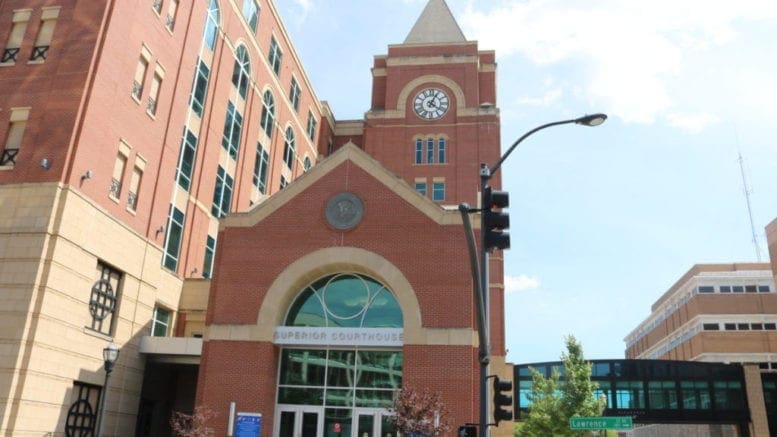The Cobb County Drug Treatment Court hosted its 4th Annual “Be Grateful” Dinner.
The Drug Treatment Court is one of Cobb County’s accountability courts, created to provide alternatives to incarceration for those whose violations can be best handled by counseling, therapy, and recovery, rather than punitive measures
According to an article about the “Be Grateful Dinner” on the Cobb County website, “In this heartwarming event, participants, staff, and community partners gathered to celebrate recovery, express gratitude, and share a traditional Thanksgiving meal.”
The dinner was held at Covenant Presbyterian Church, and included a game of Singho, where participants sang along to their favorite songs.
The article stated “Game winners received recovery-themed prizes, including T-shirts, thermal mugs, and adult coloring books.”
“I am incredibly proud of our participants who work hard every day on their recovery journey,” said Porsha Winfrey, Program Coordinator for the Cobb County Drug Treatment Court. “Events like this allow us to not only celebrate their sober milestones but also recognize the strength and resilience it takes to stay on the path to recovery. It was truly heartwarming to see everyone come together, filled with hope, joy, and gratitude for how far they’ve come.”
About the Accountability Courts
Materials distributed by Cobb County Superior Court describe Cobb’s four accountability courts as follows:
“Cobb Superior Court has four such courts: Drug Treatment Court, which includes both regular and intermediate tracks; Veterans Accountability and Treatment Court; Mental Health Court; and Parental Accountability Court. Various county and state offices collaborate with the judges and staff in operating individual accountability courts.”
The purpose of the accountability court program is to provide an alternative to incarceration for individuals who need counseling and treatment rather than punishment.
Drug Treatment Court
The website for the Drug Treat Court describes the program and its two tracks as follows:
“Drug Treatment Court is an accountability court designed to manage individuals with substance addiction by providing an alternative to the traditional justice system.
“The Court Is designed to improve the health of our participants, not only by addressing the immediate symptoms of their addiction but also orienting participants to a new way of healthier living which can be continued for the rest of their life.
“The Cobb County Drug Treatment Court offers two programs.
“The regular track is an 18- to 24-month program, dealing with high-risk, high-need participants.
“The Intermediate track is a 12- to 18-month program for participants diagnosed with a mild to moderate substance use disorder and deemed a lower risk of re-offending. A risk-needs-responsivity assessment is completed to determine participant placement.”
Mental Health Court
The website for the Mental Health Court describes that court and its mission as follows:
“Mental Health Court is a 24 month minimum, voluntary, pre or post-plea, judicially supervised, treatment-based program for those individuals with a documented mental health diagnosis.
“The Cobb County Mental Health Court strives to improve mental health, promote self sufficiency, reduce recidivism, and offer cost effective alternatives to incarceration and hospitalization.
“A Mental Health Court represents an effort to increase effective cooperation between two systems that have traditionally not worked closely together – The Mental Health System and The Criminal Justice System.
“The program will hold participants accountable while assisting them in achieving long term stability, becoming successful family/community members, and remain law abiding citizens.”
Veterans Accountability and Treatment Court
The Veterans Accountability and Treatment Court website describes that court as follows:
“Cobb County Veterans Accountability and Treatment Court (VATC) seeks to divert eligible veteran defendants with substance dependency and/or mental illness that are charged with criminal offenses, to a specialized criminal court.
“The court substitutes a treatment problem solving model for traditional court processing.
“The veterans voluntarily participate in a judicially supervised treatment plan that a team of court staff, veteran health care professionals, veteran peer mentors, and health care professionals develop with the veteran.
“At regular status hearings, treatment plans and other conditions are periodically reviewed for appropriateness, incentives are offered to reward adherence to court conditions, and sanctions for non-adherence are handed down.”
Parental Accountability Court
The website for the Parental Accountability Court describes its purpose as follows:
“PAC seeks to address underlying issues that make it difficult for non-custodial parents to pay child support while providing judges with an alternative to incarceration in civil contempt cases.
“The program uses a team approach to meet participants’ needs as they become more accountable for supporting their children.
“Members of the Parental Accountability Court Team include the Judge, Special Assistant Attorney General (SAAG), Parental Accountability Court Coordinator (PAC-C) from the Georgia Department of Human Services (DHS), Division of Child Support Services (DCSS), DCSS local Office Manager, and representative(s) from the Cobb County Community Services Board (CSB).”
For more detailed information about the accountability courts visit this link to the Superior Court’s Accountability Court website and explore the specific programs you are interested in learning about.
